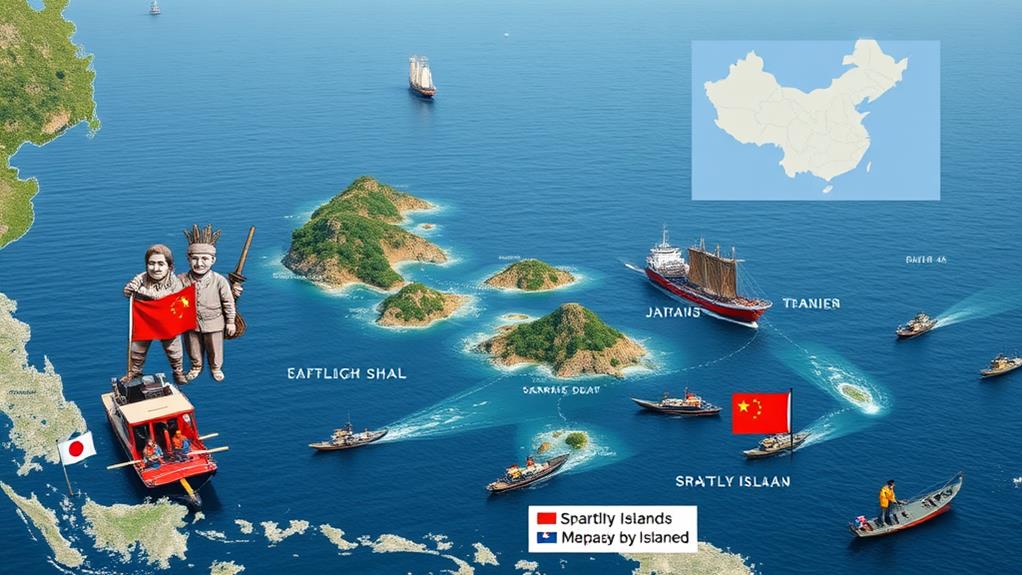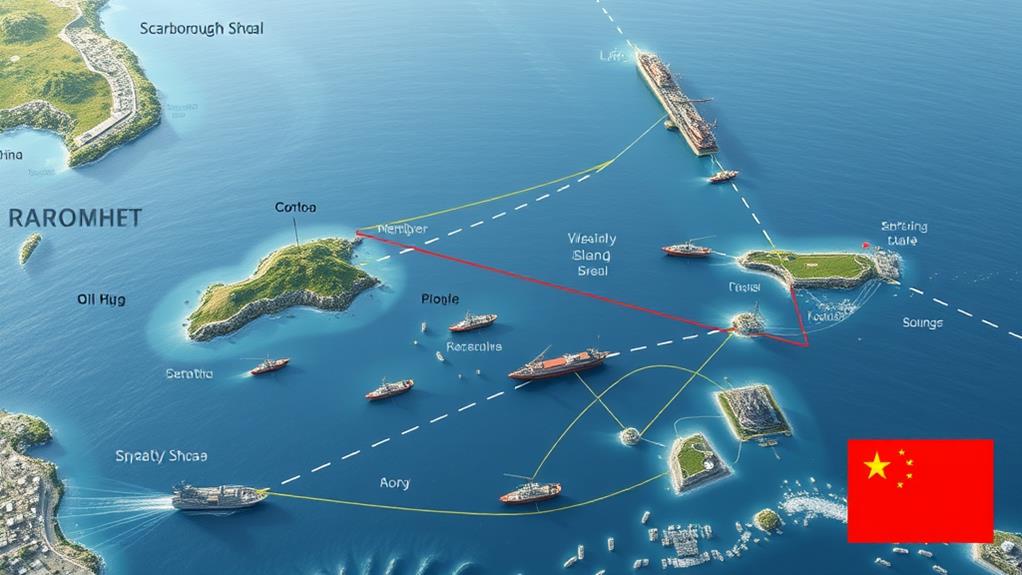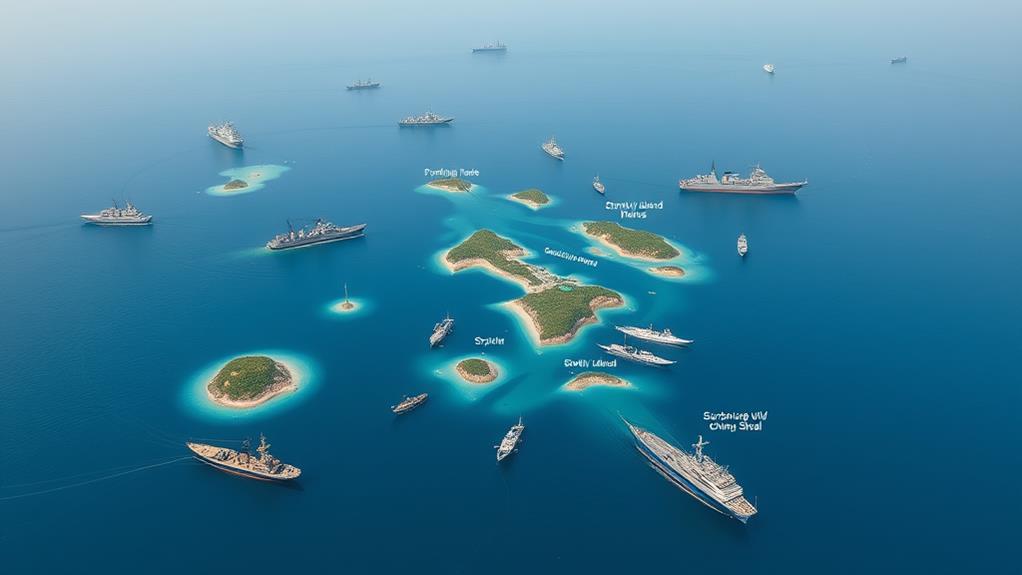The Spratly Islands and the Scarborough Shoal are crucial in the South China Sea's geopolitical landscape.
Historically, France claimed the Spratly Islands in 1933, while China's claims began in 1909, focusing on the Paracel Islands. The Scarborough Shoal has been part of Philippine territory since the Spanish colonial period.
Current disputes involve China's "U-shaped line" claim, the Philippines' assertion over Scarborough Shoal, and Vietnam's claims based on historical presence and resource interests.
The region is rich in natural resources, including natural gas, oil, and fisheries. It is also strategically crucial for trade routes and naval operations.
Tensions among claimants, including Malaysia and Taiwan, heighten regional and global security concerns. As a result, control over these areas is a critical issue that continues to shape the region's dynamics and global strategic interests.
Historical Background of Claims

The historical background of claims over the Spratly Islands and Scarborough Shoal is complex and multifaceted, spanning several centuries and involving various nations and treaties.
The Spratly Islands were first claimed by France in 1933, but France didn't formally annex them until 1932. During this time, both the Chinese and Japanese governments protested, but neither took action to reclaim the islands.
The strategic importance of these territories is underscored by the historical resilience displayed by defenders during conflicts.
Scarborough Shoal has been part of the Philippine territory since the Spanish colonial period. Historical maps, such as the 1808 *Carta General del Archipelago Filipino*, and subsequent maps published by the Spanish and U.S. colonial governments, show Scarborough Shoal as part of the Philippines.
China began to formally declare its claims in the region in 1909, starting with the Paracel Islands, and later extended these claims to include the Spratly Islands and Scarborough Shoal.
In the post-World War II period, various countries, including Taiwan, Vietnam, and Malaysia, made claims to the islands following Japan's renunciation of its claims to the islands in 1951.
The United Nations Convention on the Law of the Sea in the 1980s further intensified these disputes by establishing exclusive economic zones, making the islands more valuable for their potential resources.
This historical backdrop sets the stage for the current geopolitical tensions surrounding these territories.
Current Territorial Disputes
Current Territorial Disputes
Territorial disputes over the Spratly Islands and Scarborough Shoal have escalated significantly since the post-World War II period, driven by competing claims from various nations.
Claimants and Their Interests
China claims nearly the entire South China Sea through its "U-shaped line," seeking control over rich natural resources, fishing grounds, and strategic trade routes.
The Philippines asserts sovereignty over Scarborough Shoal based on historical maps and treaties, particularly the Treaty of Washington (1900).
Vietnam claims the Spratly Islands, citing historical presence and economic interests in oil and gas reserves.
Other claimants, such as Malaysia, Taiwan, and Indonesia, also have claims, often overlapping, driven by economic and territorial ambitions.
Consequences of Disputes
These disputes have led to tension and occasional conflict, such as China's seizure of Scarborough Shoal in 2012, which was a diplomatic breaking point with the Philippines.
The situation remains unresolved, with China maintaining control despite international court rulings invalidating its claims.
The ongoing disputes highlight the complex geopolitical landscape and the high stakes involved in the South China Sea.
Economic and Strategic Significance

The Spratly Islands and Scarborough Shoal hold immense economic and strategic significance in the South China Sea. These regions are crucial due to their rich natural resources, including an estimated 17.7 billion tons of natural gas and oil, and their status as some of the world's most abundant fishing grounds.
Historically, the region has been pivotal for resource exchange and economic development, with trade routes passing through the area for centuries.
China's control of these areas is vital for its domestic fishing industry and expanding its influence over key shipping routes. The South China Sea is a critical pathway for global trade, with over 80% of world trade passing through it, valued at around $5.3 trillion. By constructing artificial islands in the Spratly Islands, China aims to extend its Exclusive Economic Zone (EEZ), granting it exclusive rights to exploit marine resources within these zones.
The strategic importance of these islands extends beyond resources; they're also key military outposts. China has militarized several islands, equipping them with anti-ship and anti-aircraft missile systems, fighter jets, and radar systems, further solidifying its military presence in the region.
The control of these islands enhances China's trade capabilities and overall economic strength, making them a cornerstone of its regional and global strategic ambitions.
International Legal Challenges
Disputes Over Territorial Claims
China's actions in the South China Sea, particularly its control over the Spratly Islands and Scarborough Shoal, have sparked significant international legal challenges.
The main issue is the dispute over territorial claims, contested by multiple countries including the Philippines, Vietnam, Malaysia, and Taiwan. This dispute is rooted in the concept of exclusive economic zones (EEZs) established by the United Nations Convention on the Law of the Sea (UNCLOS), which has intensified competition for resources in the region.
The Importance of Maritime Routes
Historically, maritime routes have played a crucial role in international trade, similar to the significance of the Pasig River's trade route.
The strategic value of these contested waters is underscored by the competition for resources and the need for secure trade routes.
The Role of the Permanent Court of Arbitration
The Permanent Court of Arbitration has played a crucial role in addressing these disputes.
In 2016, the court ruled that China's claims to historical rights over the South China Sea are invalid. The court also ruled that China had violated the rights of the Philippines by interfering with its fishing and petroleum exploration activities.
However, despite this ruling, China continues to maintain control over Scarborough Shoal, highlighting the gap between international law and reality.
The U-Shape Line Claim
China's U-shape line claim overlaps with the EEZs of neighboring countries, leading to increased tensions and diplomatic standoffs.
This has underscored the need for a more robust international framework to resolve these disputes.
Military and Maritime Developments

Military and Maritime Developments in the South China Sea
Tensions among nations disputing the South China Sea have escalated due to military and maritime developments. The strategic location of the Spratly Islands and Scarborough Shoal makes them crucial for naval and military operations.
Country-Specific Military and Maritime Developments
| Country | Military and Maritime Developments |
|---|---|
| China | Established a presence in 1988 by forcibly removing a Vietnamese garrison from Johnson South Reef. Built artificial land on reefs and atolls since 2014. |
| Philippines | Occupied seven Spratly Islands in the 1970s and built an airstrip on Pagasa Island in 1976. |
| Vietnam | Occupied three Spratly Islands in the 1970s to forestall Chinese occupation. |
| Taiwan | Maintained a garrison on Itu Aba since the Chinese Nationalist government established it after World War II. |
Consequences of China's Military Expansion
China's military expansion in the area has led to increased tensions with other claimant nations, particularly the Philippines and Vietnam. The construction of artificial islands and the deployment of military assets have transformed the South China Sea into a high-stakes area of competition. These developments are not only about territorial control but also about securing access to rich marine resources and strategic shipping lanes.
Regional and Global Implications
Regional Implications
The South China Sea disputes have far-reaching regional implications due to the involvement of multiple nations with territorial claims and economic interests. China, the Philippines, Vietnam, Taiwan, Malaysia, and Brunei are all parties to the disputes, which exacerbate tensions among Southeast Asian nations and challenge the stability of the Association of Southeast Asian Nations (ASEAN).
The construction of artificial islands by China and its aggressive military presence have heightened concerns about maritime security and freedom of navigation, which are crucial for international trade.
Global Implications
Globally, the South China Sea disputes attract attention from major powers such as the United States, which has significant strategic interests in the region. The U.S. has conducted freedom of navigation operations to assert its stance that these waters are international, complicating relations with China and affecting broader geopolitical dynamics.
The economic stakes are significant, with estimated rich natural resources, including oil, gas, and fisheries, which make the area highly desirable.
Control over key shipping lanes can influence global energy markets and trade routes, making the region a focal point of international diplomacy and competition.
Questions and Answers
What Is the Ecological Impact of Human Activities on Scarborough Shoal?
Human activities at Scarborough Shoal have severe ecological impacts.
China's dredging and island-building have caused massive reef destruction, burying over 4,648 acres of coral reefs. This is equivalent to more than 3,500 football fields. The destruction of coral reefs is a significant concern because they provide habitat for a diverse range of marine life.
Giant clam harvesting has led to extensive damage, creating arc-shaped scars on the reef surfaces and threatening giant clam species. These activities violate international marine environmental protection laws and cause irreversible harm to the marine ecosystem.
How Do Local Fishermen Adapt to the Geopolitical Tensions in the Area?
To minimize risks, local fishermen must adapt to the geopolitical tensions in Scarborough Shoal by avoiding certain areas.
Naval patrols and hydrographic surveys are active in some areas, making them dangerous for fishermen.
Fishing within designated zones helps reduce conflicts, as it ensures fishermen operate within internationally recognized boundaries.
Adhering to international regulations is also crucial, as it demonstrates a commitment to peaceful and lawful fishing practices.
Forming alliances with other fishermen is essential for collective security.
When fishermen work together, they can share information about safe fishing areas and report any hostile activities to authorities, thereby providing a unified voice against aggression.
This collective approach can also enhance security, as a united front is more likely to deter hostile actions.
What International Organizations Are Involved in Mediating Disputes?
International organizations play a crucial role in mediating disputes.
When it comes to resolving conflicts, international organizations are often involved to provide a neutral platform for negotiations.
The United Nations is one such organization, particularly through the UN Convention on the Law of the Sea (UNCLOS). This convention sets out the legal framework for the use of the world's oceans, providing a basis for resolving disputes over maritime boundaries and resources.
The Permanent Court of Arbitration at The Hague is another key player in international dispute resolution. In 2016, the court ruled against China's claims in the South China Sea, highlighting the importance of international law in resolving disputes.
Although China refused to accept the court's authority, the ruling demonstrates the role of international organizations in promoting peaceful resolution of conflicts.
What Are the Implications for Marine Biodiversity in the South China Sea?
The South China Sea's marine biodiversity is under severe threat. Overfishing, island-building, and giant clam harvesting have devastated coral reefs, with over 20% of the Spratly Islands' reefs already destroyed.
These activities, largely driven by China and Vietnam, disrupt critical spawning grounds and marine food webs, exacerbating the decline of fish populations and ecosystem health.
Climate change, pollution, and coastal development further undermine biodiversity, making concerted regional cooperation crucial to mitigate these impacts.
How Do These Disputes Affect Tourism and Local Economies?
The South China Sea disputes have a significant impact on tourism and local economies.
The tensions in the region affect the livelihoods of Filipino fishermen, who are often harassed by Chinese ships when trying to access vital fishing grounds around Scarborough Shoal.
This limits their access to essential fishing areas, threatening their livelihoods.
The disputes also deter tourist activities and investments in the region, affecting the economic stability of local communities that depend on these resources.
As a result, countries like the Philippines suffer from reduced fishing revenues and stifled economic growth.